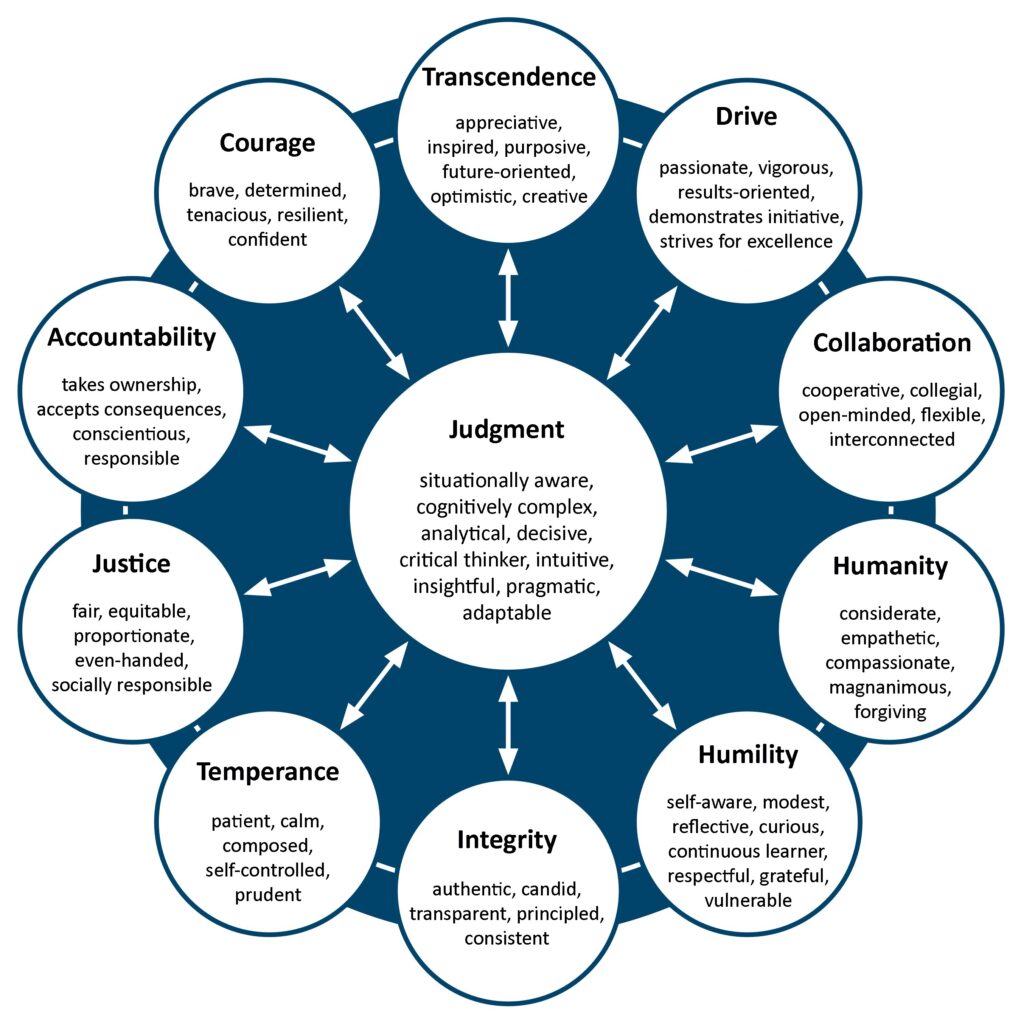What Leadership Traits are Most Important?
What makes a good leader? What are the characteristics of a good leader? These questions have long been debated, and answers have been offered by everyone from philosophers to athletes to politicians and military leaders. In this article we’ll look at a few of those definitions, then turn to what the data says about the character of a good leader. And for those of you who want to dig a little deeper, we will also explore the specific character traits you can develop in order to lead your team well.
The Research On Important Leadership Traits
Many studies have focused on leadership models and theories. Early theories held that leaders are born, whereas modern views argue that leaders are, to some extent, made.[i], [ii], [iii] While there is much debate about whether a propensity for leadership is innate or not, the mere concept of leadership development both demands and demonstrates that leader character can be learned. So, character matters. But what are the character traits of strong leaders? Working alongside the Ivey Business School, SIGMA developed the Leader Character Insight Assessment (LCIA), a leadership assessment designed to measure leadership character and provide practical insight for leadership development. The LCIA is based on a leadership model that outlines 11 dimensions of leader character. Each of these dimensions is equally important, and they work together interdependently. Together, they determine the overall strength of an individual’s character. Each dimension itself can also be broken down into subdimensions that determine the strength of the overall dimension. Figure 1 outlines how the dimensions work together. Click on each dimension below for a more in-depth definition and description of why it matters and what it looks like when put into practice:

Figure 1. The 11 dimensions of leadership outlined and assessed by the LCIA’s leadership model
Dimensions of Leader Character
Judgment
Judgment plays a central role in character, as it dictates when and how individuals choose to behave. In this way, judgment allows for the expression of character — or lack thereof. Individuals who are strong in judgment:
- Make sound decisions in a timely manner based on a critical analysis of relevant information
- Appreciate the broader context when reaching decisions
- Show flexibility when confronted with new information or situations
- Have an implicit sense of the best way to proceed
- Can see into the heart of challenging issues
- Can reason effectively in uncertain or ambiguous situations
Courage
Courage is an important dimension of leader character, because often doing the right thing is not only hard, it may even be daunting or scary. Individuals who are strong in courage:
- Do the right thing even though it may be unpopular, actively discouraged, or result in a negative outcome for them
- Show an unrelenting determination, confidence, and perseverance in confronting difficulties
- Rebound quickly from setbacks
Drive
Drive often acts as a vehicle for the expression of other dimensions of leader character. Drive is what motivates leaders to pursue new ideas and activities, creating situations in which the other dimensions of character can be expressed. Individuals who have strong drive:
- Strive for excellence
- Have a strong desire to succeed
- Tackle problems with a sense of urgency
- Approach challenges with energy and passion
Collaboration
Leaders are not lone wolves. In fact, the very essence of leadership is relational; leaders exist to guide their followers, both individually and as a team. Therefore, the ability to collaborate is an important dimension of leader character. Individuals who are strong in collaboration:
- Value and actively support the development and maintenance of positive relationships
- Encourage open dialogue and do not react defensively when challenged
- Are able to connect with others at a fundamental level, in a way that fosters the productive sharing of ideas
- Recognize that what happens to someone, somewhere, can affect all
Integrity
Integrity has often been used as a synonym for character itself. While they are not entirely the same thing, integrity certainly determines the moral and ethical quality of a leader’s character. Individuals who have strong integrity:
- Hold themselves to a high moral standard and behave consistently with ethical standards, even in difficult situations
- Are seen by others as behaving in a way that is consistent with their values and beliefs
- Behave consistently with organizational policies and practices
Temperance
Temperance is the mark of self-control. This, of course, is an important dimension of leader character. Individuals who are strong in temperance:
- Conduct themselves in a calm, composed manner
- Maintain the ability to think clearly and respond reasonably in tense situations
- Complete work and solve problems in a thoughtful, careful manner
- Resist excesses and stay grounded
Accountability
Leaders carry a lot of responsibility. In order to manage this level of responsibility well, they must be accountable. Individuals who are strong in accountability:
- Willingly accept responsibility for decisions and actions
- Are willing to step up and take ownership of challenging issues
- Reliably deliver on expectations
- Can be counted on in tough situations
Justice
In a world of much inequality and injustice, leaders need to have a strong sense of justice, and the drive and courage to act upon it. Justice, therefore, is an important dimension of leader character. Individuals who have a strong sense of justice:
- Strive to ensure that individuals are treated fairly and that consequences — both positive and negative — are commensurate with contributions
- Remain objective and keep personal biases to a minimum when making decisions
- Provide others with the opportunity to voice their opinions on processes and procedures
- Provide timely, specific, and candid explanations for decisions
- Seek to redress wrongdoings inside and outside the organization
Humility
Leaders, by default, often occupy positions of privilege and power. That’s why humility is an important dimension of leader character. Individuals who are strong in humility:
- Let accomplishments speak for themselves and acknowledge their own limitations
- Understand the importance of thoughtful examination of one’s own opinions and ideas and embrace opportunities for personal growth and development
- Do not consider themselves to be more important or special than others
- Are respectful of others, and understand and appreciate others’ strengths and contributions
Humanity
Leadership, is personal. Yes, leaders are meant to lead organizations, but more importantly, they are meant to lead people. For this reason, humanity is an important dimension of leader character. Individuals who have a strong sense of humanity:
- Demonstrate genuine concern and care for others
- Can appreciate and identify with others’ values, feelings, and beliefs
- Have a capacity to forgive and not hold grudges
- Understand that people are fallible and offer opportunities for individuals to learn from their mistakes
Transcendence
Countless studies have shown the value of organizational mission and vision statements. They entice customers and motivates employees. Mission-driven organizations are led by leaders with transcendence. Individuals who are strong in transcendence:
- Demonstrate a sense of purpose in life
- See possibility where others cannot
- Have an expansive view of both breadth and depth and have a comprehensive, long-term vision)
- Draw inspiration from excellence or appreciation of beauty in such areas as sports, music, arts, and design
Talk to Ruby

Ruby Nadler, Ph.D., Leadership Consultant
Dr. Ruby Nadler has a Ph.D in Cognition and Perception, as well as specific training in mindfulness and positive psychology. She brings this expertise to SIGMA’s executive coaching programs. In 2015 she was awarded a two-year Ontario Centers of Excellence TalentEdge Fellowship, and her research has been featured on CBC, BBC Radio, Happify, and NPR. Call or email Ruby – she would be happy to answer questions about the LCIA, leader character, coaching, etc.
Phone: 1-800-401-4480 ext. 223
[i] Boerma, M., Coyle, E. A., Dietrich, M. A., Dintzner, M. R., Drayton, S. J., Early, J. L., 2nd, Edginton, A. N., Horlen, C. K., Kirkwood, C. K., Lin, A., Rager, M. L., Shah-Manek, B., Welch, A. C., & Williams, N. T. (2017). Point/counterpoint: Are outstanding leaders born or made? American Journal of Pharmaceutical Education, 81(3), 58. https://doi.org/10.5688/ajpe81358.
[ii] De Neve, J. E., Mikhaylov, S., Dawes, C. T., Christakis, N. A., & Fowler, J. H. (2013). Born to Lead? A twin design and genetic association study of leadership role occupancy. The Leadership Quarterly, 24(1), 45—60. https://doi.org/10.1016/j.leaqua.2012.08.001.
[iii] Johnson, A. M., Vernon, P. A., McCarthy, J. M., Molson, M., Harris, J. A., & Jang, K. L. (1998). Nature vs nurture: Are leaders born or made? A behavior genetic investigation of leadership style. Twin Research: The Official Journal of the International Society for Twin Studies, 1(4), 216—223. https://doi.org/10.1375/136905298320566195.